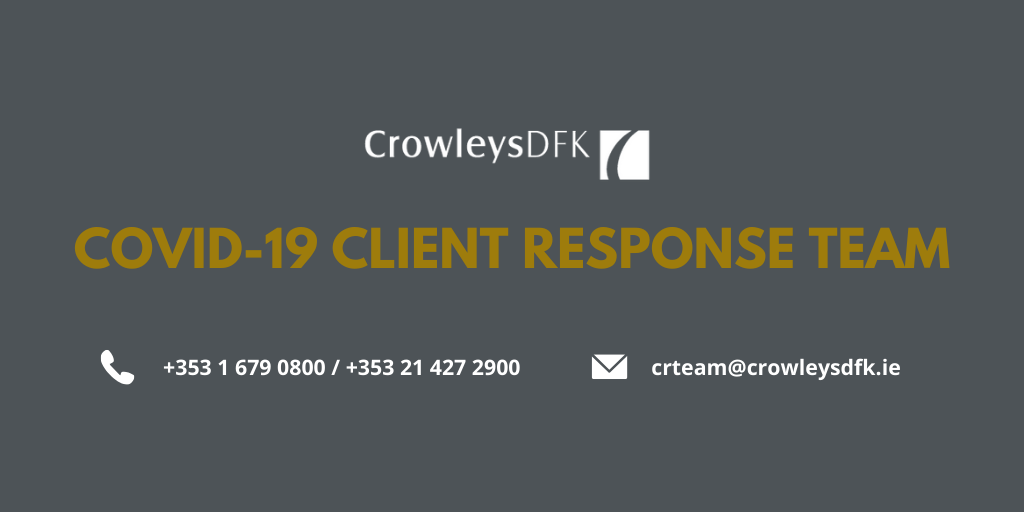COVID-19 – Supporting our Clients

Updated 22 May 2020
Our COVID-19 Client Response Team is continuing to closely monitor developments relating to COVID-19 as they emerge and is ready to provide you with quick and up to date advice on all your Banking, Working Capital, Cashflow, Tax, Employee and Insurance queries and concerns.
We have outlined below details on the current supports available to businesses, useful Government guidelines and other areas of consideration.
On May 22, the new €250m Restart Grant opened for applications.
On May 08, the Government published a Return to Work Protocol.
Business Supports
On May 15, the Government approved details of the Restart Grant. The Scheme offers grants worth between €2,000 and €10,000 to qualifying firms.
- Direct grant aid of between €2,000 minimum and €10,000 based on commercial rates bill from 2019.
- Scheme applies to small businesses with a turnover of under €5m and employing 50 people or less.
- Grants are now open for application through Local Authorities.
On May 02, the Government announced additional measures to support business which include waiver on commercial rates, warehousing of tax liabilities and grant schemes – click here.
This follows the range of supports previously put in place by the Department of Business, Enterprise and Innovation:
- A €200m Strategic Banking Corporation of Ireland (SBCI) Working Capital Scheme for eligible businesses impacted by COVID-19, which has subsequently been increased by €250m to €450m. Loans of up to €1.5m will be available at reduced rates, with up to the first €500,000 unsecured. Applications can be made through the SBCI website.
- A €200m Package for Enterprise Supports including a Rescue and Restructuring Scheme available through Enterprise Ireland for vulnerable but viable firms that need to restructure or transform their business.
- The maximum loan available from MicroFinance Ireland will be increased from €25,000 to €50,000 as an immediate measure to specifically deal with exceptional circumstances that micro-enterprises – (sole traders and firms with up to 9 employees) – are facing. Applications can be made through the MFI website or through your local LEO.
- The Credit Guarantee Scheme will be available to COVID-19 impacted firms through the Pillar Banks. Loans of up to €1m will be available at terms of up to 7 years. The scheme provides an 80% guarantee to participating banks which are AIB, Bank of Ireland and Ulster Bank.
Other Enterprise Ireland/Local Enterprise Office supports include:
- Strategic consultancy grant for SME’s to assist the company development of a strategic response plan.
- Act On Initiative, providing access to 2 days consultancy engagement at no extra cost to assess Financial Management, Strategic sourcing and transport and logistics advice.
- Key Manager Support to provide partial funding towards the recruiting of a Full or Part Time Manager with critical skills for future growth.
- Agile Innovation Fund and Operational Excellence Offer.
- Be Prepared Grant for contingency planning.
- Additional financial supports are available locally through the 31 Local Enterprise Offices (localenterprise.ie).
Employer and Employee Supports
On March 24, the Government announced a National COVID-19 Income Support Scheme to provide financial support to Irish workers and companies affected by the crisis.
In summary:
- A COVID-19 Temporary Wage Subsidy Scheme to enable employers to continue to pay their employees during the COVID-19 pandemic. It aims to keep employees registered with their employers, so that they will be able to get back to work quickly after the pandemic.
- Workers who have lost their jobs due to the crisis will receive an enhanced emergency COVID-19 Pandemic Unemployment Payment of €350 per week (an increase from €203).
- The COVID-19 illness payment will also be increased to €350 per week.
- Self-Employed will be eligible for the COVID-19 Pandemic Unemployment Payment of €350 directly from the Department of Employment Affairs and Social Protection (rather than the Revenue scheme).
COVID-19 Wage Subsidy Scheme
If you are an employer who can demonstrate that the negative disruption is leading to a minimum of 25% decline in actual or predicted turnover and an inability to pay normal wages and outgoings – you will be able to claim the COVID-19 Wage Subsidy Scheme.
The temporary wage subsidy of 70% of take home pay up to a maximum weekly tax free amount of €410 per week is aimed to help affected companies keep paying their employees.
On April 15, further changes were announced to the scheme:
- For those employees with previous average net pay up to €412 per week (equivalent to almost €24,400) the subsidy will be increased from 70% to 85% of their previous net weekly pay.
- For those employees with previous average net pay between €412 and €500 per week (equivalent to €24,400-€31,000), the subsidy will be up to €350 per week.
- The wage subsidy is now also available to support employees where the average pre-COVID-19 salary was greater than €76,000, and their gross post-COVID-19 salary has fallen below €76,000.
The new rates apply from 4 May 2020 and will not be backdated. More details can be found here.
Income tax, USC, LPT, if applicable, and PRSI are not deducted from the Temporary Wage Subsidy. However, the subsidy will be liable to Income Tax and USC on review at the end of the year.
Employers have to sign up to the scheme through Revenue.
Employers should note that the names and addresses of all employers operating this scheme will be published on Revenue’s website in due course, after the scheme has expired. Penalties will apply to any abuse of the Wage Subsidy Scheme by self-declaring incorrectly, by not providing funds to employees or non-adherence to Revenue and any other relevant guidelines.
A guidance document and FAQs on the operation of the of the Temporary COVID-19 Wage Subsidy Scheme and a guidance on employer eligibility and supporting proofs has been published by Revenue.
If you are self-employed, you can apply for the COVID-19 Pandemic Unemployment Payment.
Income Supports
A number of income supports are available from the Department of Employment Affairs and Social Protection for your employees during a COVID-19 related absence or temporary lay-off from work:
- Employees and the self-employed who have lost employment due to a downturn in economic activity caused by the COVID-19 pandemic.
- Workers who are not diagnosed with COVID-19 but who self-isolate.
- Workers whose employers do not supplement/top-up the State Illness Benefit payment (COVID-19).
- Workers who are requested to stay at home by their employer (COVID-19).
- Workers who are laid off temporarily or put on to short time working (COVID-19).
- Workers who need to take time off work to care for a person affected by COVID-19 (Coronavirus).
Amendments to the Redundancy Payments Acts
The recently published Emergency Measures in the Public Interest (Covid-19) Bill 2020, which is expected to be passed this week, contains amendments to the Redundancy Payments Act 1967 to extend the time-periods under which a person who has been laid off or kept on short-time due to COVID-19 can claim a redundancy payment from their employer.
In normal circumstances, an employee can serve notice on the employer of their intention to claim a redundancy payment if they have been placed on lay-off or short time for a period exceeding four consecutive weeks or six weeks in any thirteen-week period.
The Bill provides that, for the duration of a designated “emergency period”, employees on lay off or short time will not be in a position to claim a redundancy payment if the lay-off or short time is due to due to COVID-19.
The “emergency period” as currently defined begins on 13 March 2020 and ends on 31 May 2020.
Cashflow and Projections
Cashflow will inevitably be an issue for all businesses in the coming weeks. It is vital that you monitor cashflow, plan and are prepared for reductions in cash inflows. Make sure that you have a cash flow projection that can be tested for various scenarios.
If you make loan repayments on bank debt you may be able to get a moratorium on repayments.
The Revenue have stated that businesses experiencing cashflow issues should still submit their tax returns on time, but that applications of interest on late payments will be suspended for VAT and PAYE liabilities. All debt enforcement activity will be suspended and tax clearance status will remain in place for businesses over the coming months.
If you need our help with cash flow reviews and projections or with your Bank or Revenue, please let us know as soon as you are aware that you have a problem.
Loss of Income
Does your insurance include cover for business interruption? Check your insurance policy and speak with your insurance broker to determine if there are any potential impacts on your business for which cover is provided in your policy. There may be little cover on common policies but some businesses may have specific Business Interruption Cover. If you have cover this can be a valuable means of recuperating loss in income.
Even if you don’t have insurance cover it will be important that you quantify the effects of the coronavirus on your bottom line. This will help you later in discussions with finance providers, suppliers, tendering etc.
- Examine all aspects of your operations to identify potential areas of impact.
- Track time spent managing issues related to the crisis.
- Keep detailed records of direct costs associated with any affected business process.
- Segregate unusual or potentially claim-related costs from normal operating expenses.
- Maintain customer correspondence regarding cancelled orders and sales.
- Retain copies of your pre-crisis projections, forecasts, budgets, meeting notes, etc. that detail expected operations.
Business Continuity
Ensuring your business and employees are operational during these unprecedented times requires careful planning and having a response team who is ready to make quick and sometimes difficult decisions. We would encourage you to look at The Department of Business, Enterprise and Innovation’s user-friendly Business Continuity Planning Checklist. This can be downloaded here.
In line with our own Business Continuity Plan and taking guidance from the Checklist, on 11 March 2020 we initiated protocols to maintain continuity on service delivery to our clients while safeguarding the health and safety of our staff. Our employees are now carrying out their work from home locations. If you need advice with your contingency planning, please contact us.
These are truly unprecedented times and Crowleys DFK are here to help you. We are at the other end of telephone (+353 1 679 0800/+353 21 427 2900) or on our dedicated email (crteam@crowleysdfk.ie) when you need us.







